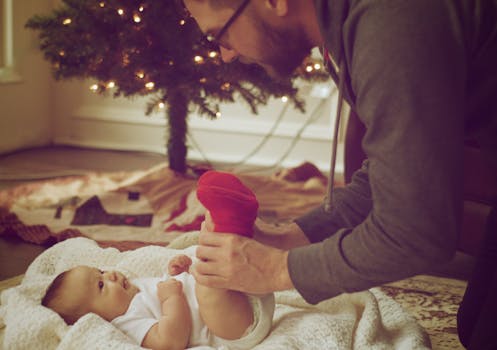Baby attitudes

" How is my baby doing? toddlers cannot answer this question ... so they talk with their bodies! It is by observing your baby behavioral changes and certain attitudes that you can judge effectively his/her well-being. A baby sees the world with different eyes. We must be careful not to judge his reactions. Parents must first listen, try to identify what they are experiencing and what they are feeling.
Decode the baby language
Look at the baby: he speaks to you with his body, he extends his hands towards you, pedal with his legs, opens his mouth, laughs with his eyes ... Learn to decode.- Lying in his recliner, teddy is 4 months old: he looks at his rattle that hangs on the floor, reaches out to him, looks at his mother, then the toy, then mom and moves in his seat. Mom translates: "Do you want your rattle? She picks him up and gives him a smile. Baby wiggles, pedal vigorously and also offers a big smile. No need for words. Everything is said by his mimicry, his vocalizations, his attitude.
- From birth, the child expresses himself by gestures. Already, in the belly, one recognizes his movements: "Here he moves! He must want to play sports. This is in the imagination of parents, but we are already in the interpretation before the first gestures and movements of head or mouth. He rubs his eyes: he is sleepy, he opens his mouth: he is happy and he sucks his fist: he is hungry. From this translation, communication can begin.
HE TOUCHES HIS EAR?
It's a moment of tranquility, He has just left his cozy bed and caressing his ear or his cheek allows him to slowly regain possession of his body after dark. Give him this morning hug, he will get you soon his best smile!Understanding baby body language
Body language is complex. There are two main trends in all babies: tension / tension and relaxation / relaxation.- Baby, stiff arms, body and head stretched back is uncomfortable and needs comfort: if he pedals very fast, pushing small cries, he discharges too much emotion, linked to a pleasure or has a great excitement. This is not always negative and precedes the verbal dialogue.
- Relaxation and happiness are manifested by a grouping of the whole body on itself: he grabs his foot or his fingers to suck, the arms are on the chest. This position is often accompanied by babbling, vocalizing, voice testing. And all this why: to attract the attention of parents ... And it works!
REFLECTION OF HIS PARENTS
In the beginning, the gestures are involuntary in the newborn. These are archaic reflexes or mimicry. Through neurological maturation, and depending on the parents' interpretation, they will take on a real meaning. Reach out to get your baby out of bed with a huge smile. You will see baby reaching for you when he wants to be hugged. The voice and the looks restore the emotions: they are very important, because it is the technique of call. And the code seems universal, because it progresses by mimicry and its expressions are the reflection of those of his parents. On his face, his parents recognize whether he is happy, worried, annoyed, questioning, relaxed or uncomfortable.Baby is anxious at night
To indulge in sweet dreams, a baby needs to feel reassured. If he calls you (cries, weeping), go to his room without delay, because he knows he can count on you. It's not a whim, he just needs your presence. Lie a few minutes at his side, give him a sense of security that will accompany him throughout his life. By refusing, you abandon him to his anguish and he will have to confront himself alone at night, at the cost of a significant psychic expense. The rocking has incomparable calming virtues. By finding the swing that has known in your belly, the child will regulate his breathing and his heart rate on this tempo ... and his little miseries will diminish.THE MOST COMMON EXPRESSIONS
- All the moms of the world have watched them.
- Quiet: he is awake, his gaze calm, he sucks his thumb and pacifier to comfort himself. He finds in himself the means to be calm and reassured.
- Uncomfortable: frowning, tense face, rubbing his eyes. Is he sleepy? Is he upset? In any case, he asks for help, he needs us to take care of him very quickly.
- Intrigued: round eyes, very serious look, he is in front of a situation or unknown object. He is facing an unexpected situation.
- Desperate: his face is contracted, his tongue out, his body all tense.
- Casual: rolled up on itself, it is the position of relaxation , he sucks his foot or his fingers. Conversely, the position of extension is synonymous with evil being.
- In demand of contact: the glance fixed on mother, the opened mouth in vocalizing, an arm extended towards her to attract her attention, all is used to better be understood.
Commentaires
Enregistrer un commentaire